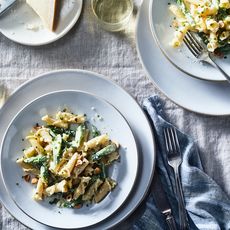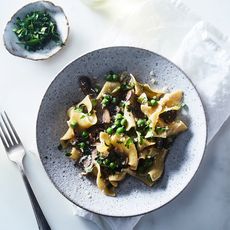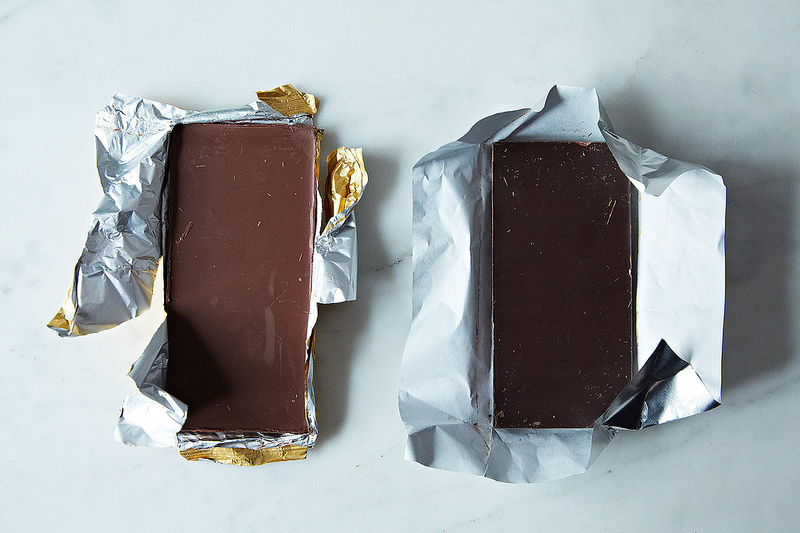When people think of mascarpone, they usually think of one thing (if they think of anything at all): tiramisu. The iconic Italian dessert has layers of boozy ladyfingers, chocolate shavings, and whipped mascarpone. It’s what gives tiramisu its tanginess; why you can eat a big serving and come back wanting more even though it’s pretty rich.
I’m here to rock your mascarpone world.
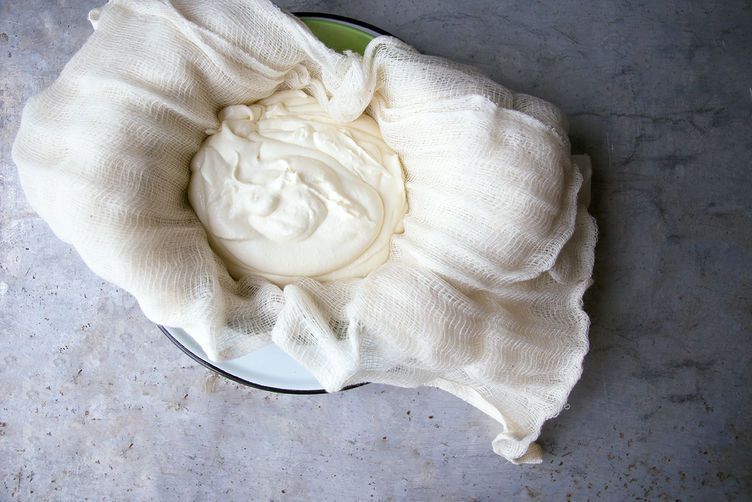
by Valerio Farris
First, a little background: Mascarpone is essentially an Italian version of cream cheese, though with a slightly higher fat content; mascarpone must have 40% fat while cream cheese only needs to have 33% fat. Cream cheese is also tangier than mascarpone, which tends towards the richer side of things. In fact, mascarpone most closely resembles French crème fraîche. Both are soured by lactic culture, but mascarpone is a little sweeter and more mild.
All this to say, mascarpone is a lot more versatile than we give it credit for. It doesn’t deserve to be pigeonholed into the role of “occasional dessert ingredient.” In fact, mascarpone works quite well in dishes both sweet and savory. It’s also surprisingly easy to make, so you don’t even need to run out to a specialty grocery store to track some down.
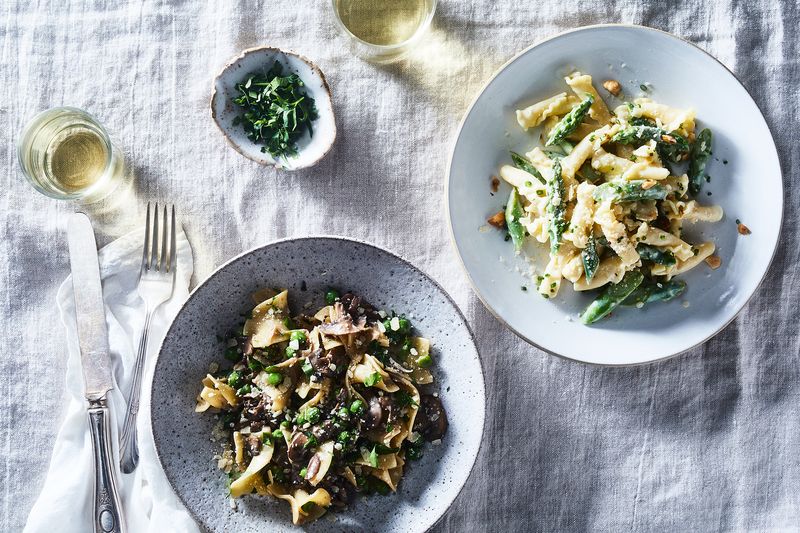
Photo by Julia Gartland
Here are 5 ways to use mascarpone’s ultra-creaminess to make your savory meals surprisingly rich—with very minimal effort.
1. Shmear it
Use mascarpone on a bagel in lieu of cream cheese for a next-level smoked salmon supreme, or spread it on seedy rye toast to make some open-faced sandwiches that are very “Italy meets Scandinavia.” Some topping suggestions:
- Smoked trout and pickled red onions
- Cucumbers, salt, and sesame seeds
- Roasted mushrooms (or any leftover roasted vegetables hanging in your fridge)
- Thinly shaved asparagus and lemon juice
2. Soup it.
Add it to freehand puréed vegetable soups to make them maximum rich with minimum work. Good news: just a spoonful will go a long way here. Or use mascarpone as a creamy garnish to cool the heat of spicy tomato soup and add a creamy touch to summery gazpachos. Bonus: it looks super pretty when you swirl it in with your spoon.
3. Spread it
Spread it onto pizza in lieu of tomato sauce, or dollop small spoonfuls onto just-out-of-the-oven ‘za for creamy, melty pockets sort of like the inside of burrata. May I suggest dolloping some onto a margherita to make it uber fancy, or spreading thinly onto sough and topping it with shaved summer squash and mint?
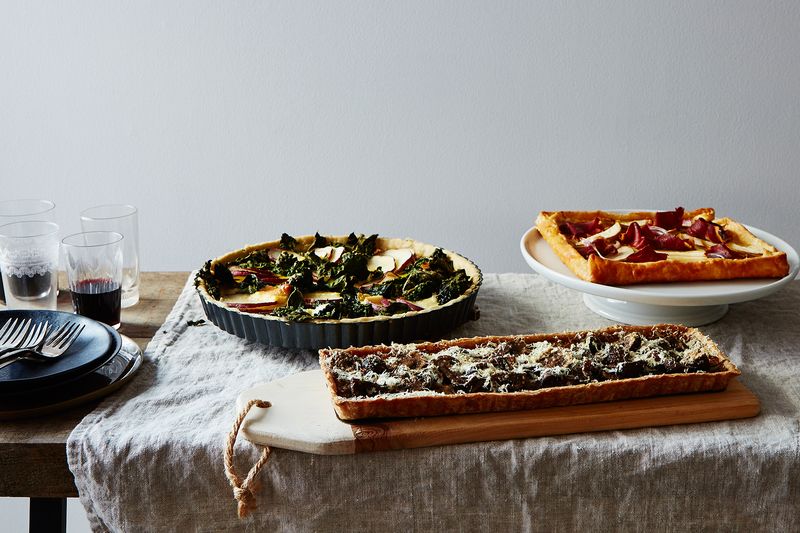
by Erin McDowell
Mascarpone also works very well as a creamy layer in savory tarts, especially if those tarts involve blistered vegetables like eggplant and zucchini and lots of herbs. (And pretty soon, juicy tomatoes!). Or incorporate it into a gratin, especially if that gratin containers cauliflower or hearty greens. Just spread a little between the vegetable layers with a spoon, or else dollop in on top.
4. Scramble it
Add mascarpone to your scrambled eggs. I know I’m starting to sound like a broken record here, but it will make them incredibly rich and special and so much better than your average Wednesday morning scramble, even though they take no extra time. Merrill likes to whip mascarpone into her eggs pre-scramble, but I like to add it halfway through the cook time so that I come across melty cheese pockets mid-bite. (Side note: melty cheese pockets would be a great band name.] If you’re feeling fancy, you can also use a swipe of mascarpone as a filling for an omelet, especially if there are already some peas and chives or mint involved.

by Merrill Stubbs
5. Stir it
When stirred into risottos and pastas just before serving, mascarpone melts into the most silky, luxurious 1-ingredient sauce. You can even stir a few spoonfuls to finish grits or polenta for an extra creamy touch. Try adding it to nutty cauliflower risotto, using it in place of cream for a springy green pasta, or incorporating it into your next baked noodle creation.
As a bona fide pasta fiend, noodles are my favorite savory to make use of the creamy Italian cheese. (If you were curious, my favorite sweet way is using it to dip strawberries, which I then roll in brown sugar.) Here are two recipes that really show how easygoing, how friendly mascarpone can be:
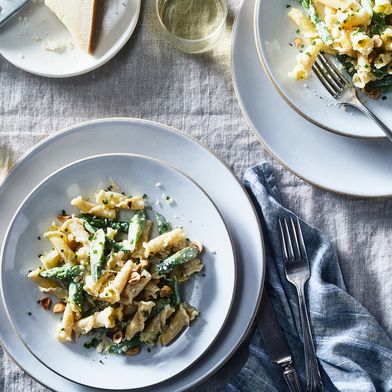
by Catherine Lamb
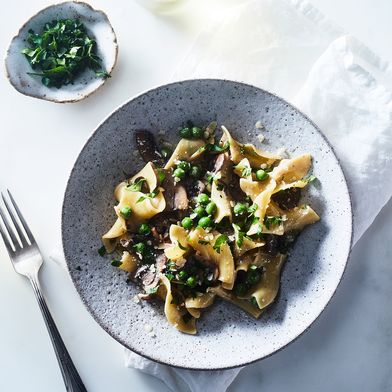
by Catherine Lamb
But, in a pinch, you may not even need a recipe. I usually like to keep things simple, tossing my pasta of choice with some olive oil, garlic, and herbs in a pan with a little pasta water, maybe adding in some vegetables. Once a glossy sauce develops, I’ll add in a few spoonfuls of mascarpone and let it melt, coating each noodle in a creamy sauce that’s slightly sweet and nutty and pretty much begging to be covered in more herbs and a grating of Parmesan.
It’s also excellent stirred into a simple tomato sauce, and will stretch and enhance a pesto like nobody’s business.
-
1
pound asparagus, sliced into 3/4-inch pieces (about 2 cups) -
2
tablespoons olive oil -
1/2
pound short, curly pasta, like campagnelle or rotini -
1/2
8-ounce container marscapone -
Zest of 1 lemon -
Juice of 1 lemon -
1
cup grated Parmesan cheese -
1/2
cup chopped, toasted hazelnuts -
2
tablespoons chives -
Salt and Pepper
-
1
tablespoon butter -
1
tablespoon olive oil -
1
small onion, sliced thinly (or 1/2 of a large onion) -
2
cloves garlic, minced -
1
pound mushrooms, sliced (I used crimini, but any type will work!) -
3/4
cup dry Marsala wine -
1/2
8-ounce container of mascarpone -
8
ounces frozen peas, about 1/2 of a bag, thawed -
1/2
pound short pasta, like egg noodles or rigatoni -
2
tablespoons flat-leaf parsley, chopped -
Salt and pepper -
Parmesan, for serving
How do you use mascarpone, outside of tiramisu? Bonus points for savory suggestions!
(via Food52)

